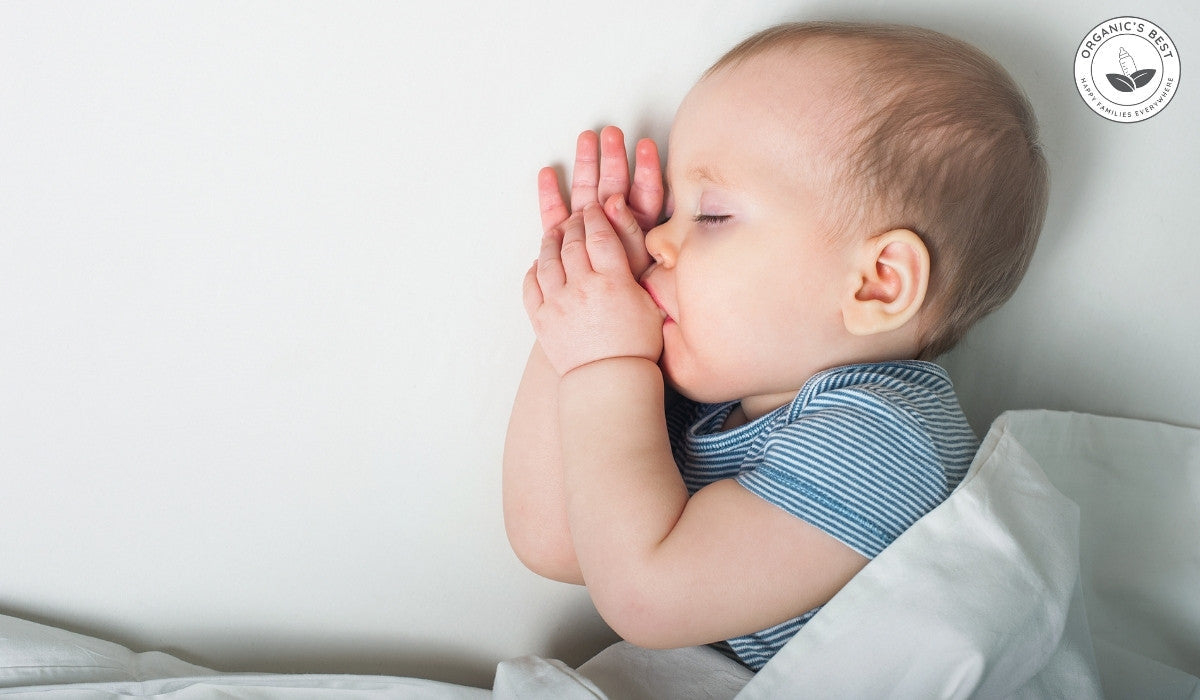Click to Get 2 FREE Boxes/Cans
Only New Customers! Click HERE to Get 2 Extra Boxes/Cans for Free With Your First Order.
BABY FORMULA
Offering new parents top-quality European infant formula from renowned brands like HiPP, Holle, Kendamil, and more. If you’re uncertain about which product to choose, our Formula Finder can help you make the best decision for your baby.
Baby Food
Offering new parents a premium selection of European baby foods, including jars, pouches, cereals, and snacks from esteemed brands like HiPP and Holle.
Newborn Sleep Schedule: A Complete Guide
by Agustina Fernandez March 29, 2022 12 min read

It is no secret that sleep is important for newborns, but we don’t often stop to consider why; let's delve deeper into the world of sleep to find out.
Your baby’s brain almost doubles in size in their first year of life. Throughout this period of rapid development, much of their learning occurs while asleep. Adequate sleep is vital for newborn brain development and helps to support the formation of new neural connections.
An important step in preparing newborns to process external stimuli and learn about their environment is a good night's rest. Sleep is also crucial when it comes to memory consolidation because it strengthens babies’ memories of things they learned while awake.
Beyond mental development and learning, sleep is important for immunity. In this article, we’ll not only discuss how sleep powers your baby’s mental and physical development, but we’ll also have some tips for how you can encourage it!
Table of Contents
- How Much Sleep do Newborns Need?
- Sleep in the 1st Month of Life
- Sleep from the 2nd to the 3rd Month of Life
- Sleep from the 4th to 6th Month of Life
- Sleep from the 6th to 11th Month of Life
- Sleep during the 12th Month of Life
- What do Baby Sleep Cycles Look Like?
- Good Practices for Improving Newborns' Sleep
- Baby Sleep Safety
- Conclusion
How Much Sleep do Newborns Need?
Newborns have unique sleeping patterns. In part, this is because they haven’t yet developed a sense of day and night. Another reason is that their tummies are too small to hold enough breast milk or formula. That means they have a hard time staying full for long periods, so even though they sleep a lot, they also wake a lot to eat, regardless of whether it’s day or night. Unfortunately, this means you can't expect to put your infant on a newborn sleep schedule just yet. They will need more time for their circadian rhythm to mature before you can begin implementing a strict schedule.
Needless to say, fluctuations in newborn sleep patterns are not uncommon, and it doesn’t necessarily point to sleep disturbances. That being said, newborn babies need to get enough sleep because they need it for all the growth and development in their first months of life. In recognition of the instrumental role that sleep has for babies, the National Sleep Foundation has outlined sleep recommendations based on babies’ age:
-
Newborns (0 to 12-week-old babies) - Need between 14 and 17 hours of sleep
-
Infants (12-week-old to 12-month-old babies) - Need between 12 and 15 hours of sleep
-
Toddlers (1 to 2-year-old babies) - Between 11 and 14 hours of sleep

The above chart shows how much sleep babies need during a 24-hour period. But it’s important to keep in mind that every baby is different, and as they grow, their sleep patterns change. Some babies need lots of sleep, some babies do just fine with less, and some babies start sleeping through the night before others. So don’t stress if your baby isn’t sleeping for the average amount of time. As they get older, they’ll get into a more consistent rhythm! If you are concerned about whether your baby is getting enough sleep, always be sure to reach out to your pediatrician.
How Newborn Sleep Patterns Change Over Time:

Sleep in the 1st Month of Life
Parents know just how unpredictable newborn sleep patterns can be. Undoubtedly, these first months can be the hardest for parents who have the challenging task of repeatedly waking up to tend to their little ones.
Without established sleep-wake rhythms, newborn babies need regular daytime naps in addition to nighttime sleep. Generally, newborns sleep around 8 hours during the day and for 8.5 hours at night. The average newborn naps between 4 and 8 times a day, and the duration of these naps varies. Naps tend to last for roughly 25 minutes to a few hours. Between naps, newborns have periods of wakefulness lasting approximately 45 minutes.
It’s normal for newborns to have short bursts of sleep known as sleep cycles. These cycles usually last between 20 and 50 minutes. When a baby wakes between their sleep cycles, it is very normal and is typically just to stir, and then they quickly fall back to sleep. They will wake up properly when they need to be fed or changed.
If a newborn wakes up at the end of their sleep cycle, they usually experience a quiet alert phase. This is a time when your baby is awake enough to take in and respond to their environment, but they are still very still.
Parents, there is a light at the end of the tunnel. Babies often learn to settle themselves and get back to sleep as they get older and their natural biological sleep cycle emerges. Your newborn likely won’t sleep for more than a few hours at a time, but beginning at 3 months or once they weigh 12 to 13 pounds, they may start to sleep through the night.
It is of great help to new parents to set their newborn up for healthy sleep habits early on by establishing a newborn sleep schedule. Some parents find it beneficial to synchronize feeding with their newborn's sleep schedule. However, if this doesn't work for you, that's also okay because their sleep routine always takes priority!
It's worth noting how crucial it is for new parents to account for sleep safety measures as part of their baby’s sleep hygiene to prevent the risk of suffocation and sudden infant death syndrome (SIDS).
P.S. - Scroll down to find out more about sleep safety!

Sleep from the 2nd to the 3rd Month of Life
At this time, you may wake up some mornings feeling like your baby got bigger overnight. If you think so, you may be on to something; babies go through a growth spurt around two months and then again at three months. An unmistakable sign of this is when your baby suddenly gets more hungry and sleepy than usual. Growth spurts often coincide with increased hunger (and sometimes fussiness), while a sleep regression specifically refers to changes in sleep cycles, though the two can overlap.
Around the two-month mark, you may start getting excited about your baby becoming increasingly alert. The downside is that their newfound alertness can result in shorter and more erratic sleeping. Plus, it can become increasingly difficult to get them to sleep in the first place!
For a few lucky parents, by the time their baby turns three months, their sleep and feeding schedule may start to regulate itself. Once babies' sleep patterns become more predictable, you’ll start noticing that they sleep for longer at night and have more wakefulness during the day. You may also notice a decreased need for night feedings as day feeding increases.
During this period, babies nap around 3 to 5 times a day for 30 minutes to up to a few hours. At three months, babies can remain awake for around 1.5 hours before becoming overstimulated or overtired. That's quite the jump from the 45 minutes during their first month of life. But for busy parents on the go, that 1.5 hours can fly by. So, to help you remember when it’s time for their next nap, it may be helpful to set a timer for when your baby wakes.
This period is generally a bit too early for formal sleep training. You’ll probably want to wait until about four months before implementing a newborn sleep schedule. However, this can be a good time to lay the foundation for a pre-sleep routine by adding fixed points to your little one’s day. For example, start by introducing a consistent wake-up time, then move on to a fixed first nap time, then to a fixed bedtime, and so on. This way, you can ensure predictability in their sleep, which is essential to helping your baby sleep through the night later in life.

Sleep from the 4th to 6th Month of Life
The 4 to 6-month period is a time of transition. Some babies may need fewer naps, others may struggle to get to sleep for naps at all, and most will experience sleep regression. Sleep regression may sound like a scary term, but spoiler alert, it’s a sign that your baby is developing normally!
Sleep regression happens at about the 4-month mark when babies experience a regression in their sleep patterns. This means that they start to sleep like a newborn again, so shorter naps, frequent wakings, irritability and fussiness, and needing to be put to sleep the same way every time are the obstacles you can expect to encounter.
This is the result of developmental changes to their sleep. Babies immediately enter REM sleep (light sleep) for their first three months of life; this all changes at four months old. At four months, they enter non-REM (deeper sleep), and the deepest part of their sleep occurs at the beginning stages of sleep. Then, babies go back and forth between lighter and deeper sleep in the middle of the night.
During this window in the middle of their sleep, babies are prone to increased waking and will cry out to be soothed back asleep. The 4-month regression can be very hard on parents who desperately want their baby to sleep. Thankfully, this phase doesn't last forever. On average, this period lasts between 4 and 6 weeks, and you can help make this a more peaceful time for everyone involved by sticking to a calming bedtime routine.
There are some helpful strategies to get your baby to fall asleep. Parents have found success by implementing things like gentle baths, story time by dim light, teaching their baby to self-soothe, playing soft music, and staying consistent with their sleep routine.

Sleep from the 6th to 11th Month of Life
At around six months of age, babies may begin experiencing separation anxiety. This condition is exacerbated by becoming overtired or overstimulated. Babies can’t understand that separation from their parents is temporary, which causes them anxiety.
You may start to see your little one fighting naptime and bedtimes, and increased wakefulness throughout their sleep. This is your baby's way of showing you that they want to be around you. Teaching your baby to self-soothe is key to overcoming this problem.
Around 7 months, your baby may again start to sleep through the night without feeding and only need around 2 or 3 naps. They should be napping for a few hours a day, with the last nap being the shortest at around 30 to 45 minutes. At night, they should be sleeping between 11 and 12 hours. Usually, babies at 8 months old can sleep between 9 and 12 hours a night and nap for around 3 to 4 hours a day. Typically, during the day, they need a morning and afternoon nap.
By 9 months, babies need about 14 hours of sleep; they should ideally be taking 2 naps a day, with no more than 3.75 hours between sleep. At this point, some babies will experience the 9-month regression一it- it can start to feel like there's a regression around every corner. The signs of the 9-month regression are similar to the ones your little one had during their previous regressions. The 9-month regression is characterized by increased wakefulness, fussiness, trouble falling asleep, and fighting sleep.
Here are some tips for making this time easier for you and your baby. Stick to a bedtime routine and naptime schedule, remove toys or other distractions from their crib, ensure they get enough movement during the day to tire them out for the night, and help your baby fall asleep in their bed as much as possible.
By 10 to 11 months, babies' sleep patterns are likely to normalize again. They should be sleeping around 12 to 16 hours a day. At this stage, afternoon naps become less restorative, so to prevent your baby from becoming overtired, it can sometimes help to shorten the last wake time between their second nap of the day and bedtime.

Sleep during the 12th Month of Life
Your little one is now officially a toddler! Parents will be glad to hear that by 12 months, most babies can sleep through the night. On average, toddlers get between 10 and 12 hours of sleep at night, with a feeding and roughly one or two short naps throughout the day.
At one year, your toddler is going through lots of developmental changes that can impact their sleep. Therefore, it is especially important to stick to a consistent sleep schedule to help them adjust to all the changes that they're experiencing.
What do Baby Sleep Cycles Look Like?

For newborn babies, sleep stages include periods of non-rapid eye movement or NREM sleep (quiet sleep) and rapid eye movement or REM sleep (active sleep).
When newborns are in the quiet phase, they sleep more still, have a more steady and even breath, a slower heart rate, and no eye movement. During the active sleep stage, a baby's body moves erratically, and there is often groaning or crying out, eye-opening, and loud or irregular breathing.
Unlike older babies, who fall asleep, young babies spend roughly the same amount of time in active and quiet sleep. Once your little one reaches three months, this all changes. At this point, they start to experience the same sleep stages as adults.
This new sleep pattern can be broken down into four distinct stages depending on the type of brain waves occurring during sleep. The stages are:
-
Stage 1: NREM 1
-
Stage 2: NREM 2
-
Stage 3: NREM 3
-
Stage 4: REM
During babies’ third stage of NREM sleep, also known as deep sleep, many important things are happening. This is when their brain restocks its energy supply; this way, your little one gets the energy they need to face a new day. Both NREM 3 and REM sleep are involved in brain development, learning, and memory.
So, we know sleep is important for your little one’s mental development, but sleep is also a big part of their physical development. During NREM 3 sleep, babies’ pituitary glands release growth hormone, which helps to stimulate bone and tissue growth. In deep sleep, babies’ bodily processes are slowed down, giving their immune system more energy to fight off potential infections.
Good Practices for Improving Newborns' Sleep
During the first two months of life, babies' circadian rhythms are not yet stable or consistent. So, the most helpful thing you can do for your little one is to try to help them maintain an appropriate sleeping pattern.
Here are some easy and effective tips on how to establish healthy baby sleep patterns in a short time:
-
Make nighttime synonymous with calm time by winding down playtime fun and ensuring your baby goes to bed in full darkness.
-
Help your baby to associate daytime with activity by taking them outdoors, as the sunlight will help to cue their brain for wakefulness.
-
Offer your baby a nighttime meal of breastmilk or formula before bed.
-
Breastfed babies naturally get tryptophan from their mother's milk; for formula-fed babies, a formula enriched with DHA (omega-3 fatty acid) will increase the length and quality of sleep.
- For a great DHA-enriched formula, think about trying HiPP Organic Combiotic®, but be sure to consult your child's doctor first.
Once you start seeing signs of baby sleep readiness 一this includes rubbing eyes, yawning, and fussiness, then you know it’s time to put them to bed for a comfortable and safe sleep!
Baby Sleep Safety

Putting your baby to bed safely is important for protecting your baby from dangers such as sudden infant death syndrome (SIDS) or suffocation. Let's take a look at some of the Dos and Don'ts for safe sleep.
Dos
-
Always put your baby to sleep on their back on a firm and flat surface
-
Have your baby sleep on a firm, flat surface until they turn 1 year old
-
Put your baby to sleep in their bassinet or crib
-
Remove any hazards from where your baby sleeps, for example, window cords or wires
-
Keep your baby's room at a comfortable temperature
Don'ts
-
Put your baby to sleep on soft surfaces
-
Share the bed with your baby
-
Use sleep positioners to keep your baby in place
-
Let your baby sleep in a stroller, sling, car seat, or carrier
-
Use cribs with drop side-rails
-
Swaddle your baby in hot blankets in warm weather, as this can make your baby overheat
Conclusion
Newborn babies undergo rapid growth, and sleep is an essential component of their mental and physical development, learning, memory, and immunity. Newborns have day/night confusion due to their immature circadian rhythms, meaning that their sleep patterns can be unpredictable, with lots of wakefulness and short bursts of sleep. So don't be surprised if your newborn baby isn't sleeping consistently.
Your baby's sleep patterns will change as your baby grows. Babies’ sleep cycles become more stable and similar to adults' with time. However, periods of sleep regression often occur. Although this can be frustrating to parents who were happy to get out of the newborn sleep phase, it’s a normal part of their development and a sign that your baby is on the right track.
By twelve months, most toddlers can sleep through the night. An important step in getting them to that point is establishing good sleep habits early on. Those who establish a newborn sleep schedule during the early stages of parenthood tend to have less stress for themselves and their baby in the long run.
Finally, for all babies but newborns especially, parents should follow sleep safety guidelines to help prevent SIDS or suffocation. That way, you can rest assured your baby will have a comfortable, safe sleep. With that, we wish you and your little one some happy sleeping!
Disclaimer:
Please be aware that this information is based on general trends in babies, and it is not medical advice. Your doctor should be your first source of information and advice when considering any changes to your child’s formula and when choosing your child’s formula. Always consult your pediatrician before making any decisions about your child’s diet or if you notice any changes in your child. Breastfeeding is the best nutrition for your baby because breast milk provides your child with all the essential nutrients they need for growth and development. Please consult your pediatrician if your child requires supplemental feeding. |
Agustina Fernandez
Dr. Agustina Fernandez earned her medical degree from the prestigious Universidad Nacional de Córdoba, Argentina. With a deep-rooted passion for pediatrics, Dr. Fernandez is currently on the path to specializing in children's healthcare. Recently, she has delved into the vital field of infant nutrition. Her research interests include breastfeeding, infant formula, and baby food in little ones’ formative years. Dr. Fernandez's commitment to this area of study underscores her dedication to ensuring the health and well-being of children from their earliest days.
Leave a comment
Comments will be approved before showing up.
Also in Organic Infant Nutrition and Health Blog

Spilled Milk: Feeding Unfiltered with Hayley
by Agustina Fernandez February 04, 2026 4 min read
Read More
Baby Bath Guide: How to Bathe a Newborn
by Agustina Fernandez February 03, 2026 8 min read
Read More
Does Your Kid Need More Vitamin D in Winter?
by Agustina Fernandez January 28, 2026 7 min read
Read More
Reviewed by Dr. Bardha Qerimi, MD
-

Dr. Bardha Qerimi: Medical Reviewer of Organic's Best Blog
Dr. Bardha Qerimi completed her medical studies at the University of Prishtina in Kosovo, where she began her journey into the field of medicine. She has since developed a career in medical research, contributing to projects with notable organizations, including the World Health Organization (WHO).
